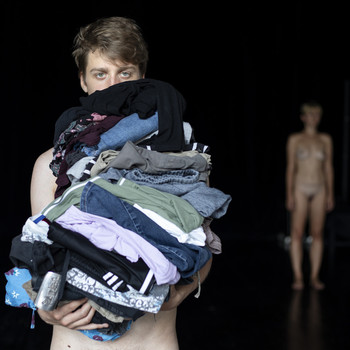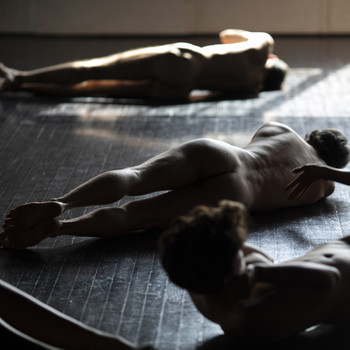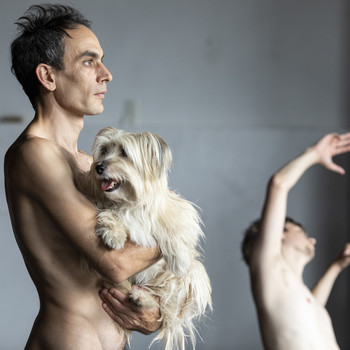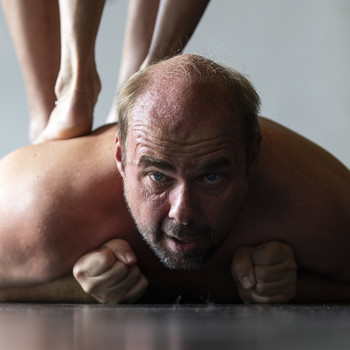Physis
Choreography of contagion
Via Negativa
Schedule
Online première 9. april 2021
Running time 1 hour 30 minutes. No intermission.
Idea Anita Wach, Bojan Jablanovec
Concept and director Bojan Jablanovec
Choreographers Anita Wach, Kristina Aleksova
Music and sound designer Eduardo Raon
Lighting designer Igor Remeta
Costume designer Olja Grubić
Executive producer and public relations Sara Horžen
Photographer Matjaž Rušt
Creator of video trailers Špela Škulj
Producer Špela Trošt
Contains fragments from the Slovenian translation of book by Friedrich Nietzsche Thus Spoke Zarathustra (translated by Janko Moder).
Fragments from the musical compositions
Jacques Offenbach: Orphée aux Enfers – Galop infernal
Aram Hačaturjan: Sabre Dance
Jacques Offenbach: Les oiseaux dans la charmille (Les contes d'Hoffmann)
Richard Wagner: Tannhäuser Overture
Charles Ives: Central Park in the Dark
Antonín Dvořák: Symphony No. 9
Olivier Messiaen:Turangalîla Symphony
Dean Kay, Kelly Gordon: That’s Life
Creative Commons licensed material
Omnisounddesign: Swan_Signet_Honk and Rustle (edited)
Milo: Bergen Ships Msfinmarken_Bergen (edited)
Jared 333: MiloASMR Wheezing (edited)
Performers
Friedrich Nietzsche Grega Zorc
Superflous Aleksandra Kmetič, Anita Wach, Daniele Tenze, Jernej Škof, Kristina Aleksova, Loup Abramovici, Mitja Lovše, Neža Blažič, Nina Goropečnik, Olja Grubić, Rok Kravanja, Sara Horžen, Timotej Novaković, Tina Habun, Tjaša Črnigoj (Ena Kurtalić), Rea Vogrinčič, Vesna Hauschild, Lena
Voices Gallina vocal group, conductor Ana Erčuj
"A state? What is that? The state, I call it, where the slow suicide of all — is called life. For the superfluous ones was the state devised! There, where the state ceases — there only commences the man who is not superfluous."
Friedrich Nietzsche
Contagion is not merely a medical but an ideological fact. Diseases, beliefs and ideas spread in social interactions and expose the power and danger of bodies in contact, as well as the fragility of social relationships. "The theatre, like the plague," says Antonin Artaud, "releases conflicts, disengages powers, liberates possibilities," and threatens, doubts, disturbs the conventions of the established cultural hierarchy. The power of theatre is the virulence of its ideas and beliefs. Democracy has become a catacomb of the healthy, responsible and normal. The state needs people who are weak enough to become dependent and obedient enough to remain useful. There is no democracy for sickness and dying, no democracy for visions of a rebellious spirit or for the trembling of a weak heart – there is no democracy for nature. But nature, though accustomed to dying, still has the power to resist the brutality of civilisation; and civilisation, though willing to risk everything for its own self-preservation, still has enough time to stop the terror of the "good and just". We The creative team dedicates the performance to Friedrich Nietzsche, who suffered a nervous breakdown on 3 January 1889, and a series of strokes after 1898, which partially paralysed him, leaving him unable to speak or walk. After contracting pneumonia, he died on 25 August 1900. The diagnosis of his "mental illness" is still the subject of medical debate.




